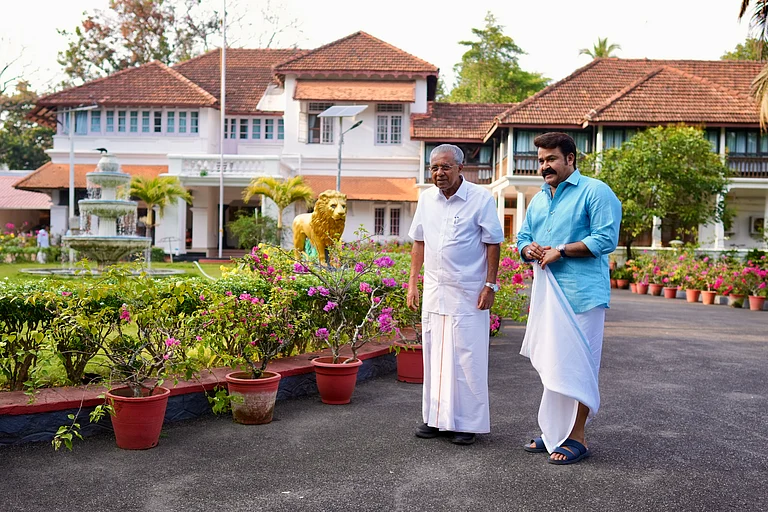At the Chhatrapati Shivaji Maharaj International Airport, Mumbai, Taniya Chatterjee — an actress and influencer known for web series like Gandii Baat Season 4 (2019) and Class of 2020 (2020) — stood straight in front of the cameras with her long, straight hair, wearing a peach oversized T-shirt. She then started taking it off, turning away from the paparazzi when it reached her upper body, and turned back to reveal her little black corset dress, posing confidently for the cameras. This viral stunt of hers has become a statement, and videos of her doing this are all over social media.
Before social media, it was the paparazzi that helped the audience and fans get sneak peeks of their favourite celebrities, and helped actors steady their position on a pedestal. But today, everyone has access to everyone’s innermost lives, with phones in their hands and social media at the tip of their finger, anything can be legitimised as viral content—baby pygmy hippo, aesthetics like ‘Brat’ girl summer, cartoons like Ganji Chudail and so on. With everything demanding so much attention from the audience, even users are feeling bombarded with content, and so online trends set in quickly and fade out even quicker. In such an attention economy, how do people make it big?
Chatterjee, with 3.4 million followers on Instagram, has also been facing a lot of troll comments and internet judgment for her viral stunt. The social media influencer moved to Mumbai almost five years ago to make her debut. When asked about her pap stunt, what’s the intention behind those moments? If it is a performance or a provocation? — She shared:
“Growing up, there were restrictions from my family. When I went clubbing or partying, I’d wear an oversized T-shirt to cover my actual outfit. I’d take them off later. Then, when I shifted to Mumbai, I saw girls being judged everywhere by society for what they wear, so I used to go out in oversized T-shirts again and then take them off. But the bigger question is, why are girls still judged by society? Why should we still have to wear oversized T-shirts?”
The influencer’s defiance is a feminist assertion of agency. It pushes back against the centuries-old policing of women’s bodies. She may use her appearance or the way she presents herself to thrive in late-stage capitalism, where seemingly everything is commodified — including people’s attention — but that doesn’t make comments on her okay, because it still measures a woman on an imagined scale of decency, which is unfair not only to her but to all women.
“The dress I wear at first, I don’t show it to the paps. I don’t reveal it immediately. I reveal it by taking off an oversized t-shirt, and then come into my avatar. People should have applauded my intelligence, that this girl came up with such a unique idea. But instead of clapping, they started trolling me. So I don’t care,” she added.
When asked how she feels when headlines reduce her to ‘actress flashes outfit in front of paps’ instead of talking about her work, she asserts, “I think people should keep talking. Keep talking about what I’m doing, whether it’s good or bad. You’re still talking about me, right? I’m still the centre of the topic, the centre of attention. So I’m happy about it.”
Recently, another young starlet and an internet sensation with 1.4 million followers on Instagram made headlines for wearing a short dress with slits from waist above. She was trolled for being too vulgar. This is not the first time she has been in the spotlight for her fashion, in fact, it is her clothing choices that made her viral in the first place. But just because she is treading the waters of digital presence in her way, does that make it okay for consumers to troll?
Responding to how she processes sexist or moralistic comments that people leave on her posts, she says, “I feel their problem is their problem, not mine. If I start making their problems my own, then it will truly become a serious problem. So whatever they comment or troll about me, I don’t give a damn. It doesn’t affect me at all. As long as you’re talking, good or bad, just talk. Love me or hate me, but you can’t ignore me.”
“Recently, the jeans look of mine that went viral — so many people called it shameless, dirty, vulgar. But if we wear hot shorts of the same length and go out, that seems perfectly fine. So why is it vulgar if I simply ripped the jeans at that spot but wore full jeans otherwise? Why couldn’t people see it as creativity?” she added.
During COVID, when actors, like other businesses, had slower incomes and other measures of making money, the influencer started her website where she made her photos and videos exclusive paid content for the audience. She has publicly spoken about earning over 10 crores through the website. When asked what she is trying to build through this platform, a fan community, a brand, or something more, she responded: “There’s a video calling feature, chat options, brand inquiry options, everything. Honestly, I could have earned double or even more by putting the content on OnlyFans, but I never did that. Many people told me — if my only aim was to earn money, I could have done that.”
“Some people experience the casting couch, or earn money in other ways behind the camera, we all know that. Isn’t that selling your ethics? What I did was in front of the camera, so how is that unethical? I used my sensuality to earn money, but I didn’t get exploited by anyone. So what’s wrong with that?” she added.
At the end of the day, whether through ripped jeans or a staged oversized T-shirt reveal, these women are navigating a hyper-competitive digital landscape on their own terms. Their choices may not align with everyone’s sense of decency, but the outrage they provoke says more about entrenched societal discomfort with women’s autonomy than it does about their clothes. In an attention economy that constantly demands reinvention, perhaps what deserves scrutiny isn’t how these influencers flaunt their style, but why doing so still attracts moral policing in the first place.






























